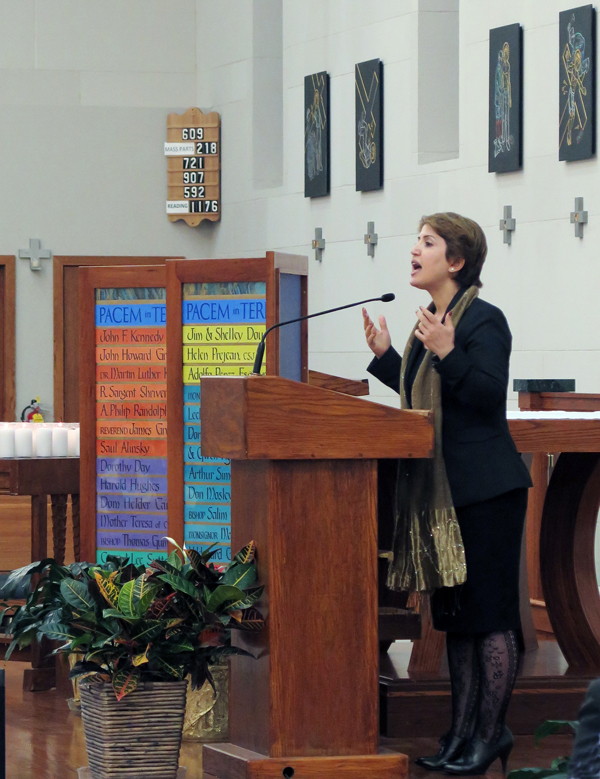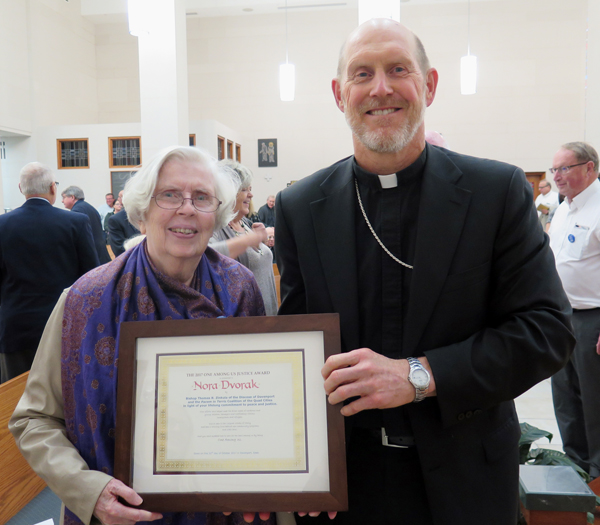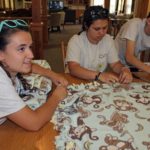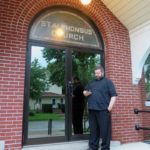Pacem honoree speaks from the heart
By Barb Arland-Fye
The Catholic Messenger
DAVENPORT — As a young child living in the Kurdistan region of Iraq, Widad Akreyi survived the Iraqi government’s offensive against the Kurds in the mid-1970s. That and other experiences of persecution convinced her to choose a path toward peace and justice, to which she has committed her life’s mission. Her selfless commitment to human rights for all inspired the Pacem in Terris Peace and Freedom Coalition to select her as the 47th recipient of the award first given in 1964.

Widad Akreyi speaks following her acceptance of the Pacem in Terris Peace and Freedom Award on Oct. 22 in Christ the King Chapel at St. Ambrose University in Davenport.
Bishop Thomas Zinkula of the Diocese of Davenport presented the award to Widad on Oct. 22 during a ceremony in Christ the King Chapel on the St. Ambrose University campus. He also presented the first One Among Us Justice Award to Nora Dvorak, a longtime volunteer in social justice in the diocese.
Widad, who is also a scientist with a PhD in global health and cancer epidemiology, gave a passionate speech about what she has witnessed, moving some in the audience to tears. “Her story is so powerful. Her talk was from the heart and her lived experiences,” marveled Sister Mary Bea Snyder, CHM.
During the first persecution she experienced, Widad recalled hearing her mother cry for help as she ran with 5-year-old Widad to safety. Weakened by malnutrition, “my head was dangling from her right arm.” Six years later, war broke out between Iraq and Iran. “During that war, our homeland was attacked three times. By the grace of God, we survived.”
War with Iran hadn’t ended yet in 1987 when the Iraqi authorities waged a new war against the Kurds, this time using chemical weapons. Iraq called this military operation “Anfal,” which is the title of a chapter in the Koran, Widad noted. Young girls and women were enslaved, accused of being infidels. Many other Kurds escaped, but thousands of children and elders died because of hunger and harsh weather conditions. Girls and women were sold as slaves in other countries, Widad said.
Survivors didn’t give up. “The more divisions the Iraqi authorities cultivated, the more we worked for a solution. The more aggression they showed us, the more time we devoted to peace and reconciliation. The more civilians they tortured and slaughtered, the more my instincts guided me to reach out to all segments of society,” Widad said. “The more they tried to erase the evidence, the more risk we took to document the atrocities and the horrors inflicted on humans and the environment. Because, one day the world will wake up and realize … the repercussions of overlooking the suffering. And on that day the souls of the victims will finally find peace.”
She referenced genocides that have occurred in the region over the last century, beginning in Armenia in 1915, and raised concerns about “crimes against humanity” that have been occurring over the past years around the world. However, she sees glimmers of hope. The tragedies have brought people of different backgrounds, cultures and religions (or no religion) together to advocate for justice and peace, she said.
“Those tireless supporters have tried to make a difference one act of kindness, one act of solidarity, one act of charity at a time. They did so because they believe all humans are born free and equal in dignity and rights. They believe in acting toward one another in a spirit of humanity because human rights are universal and justice and peace are human rights.”
Targeted populations prefer to leave, but she urged her audience to think about the ramifications. The goal of oppressors is “to change the demographics of a certain area,” she said. “If we only think of bringing people out, we may be helping the perpetrators of the genocide achieve their goal.”

Above, Nora Dvorak received the One Among Us Justice Award from Bishop Thomas Zinkula. Below, Widad Akreyi received the Pacem in Terris Peace and Freedom Award from Bishop Zinkula. The ceremony was held Oct. 22 in Davenport.
Widad cautioned the audience that easy solutions to the crises around the globe are not possible. “We must roll up our sleeves and rekindle a commitment to peace built on freedom and justice,” she said. “We must strengthen our collective moral and ethical devotion to protect liberty, enhance human dignity, and put an end to genocide and to eradicate slavery.”
At one time, the town in which she grew up thrived with diversity. Christians, Jews, Muslims and people of other faiths co-existed peacefully. That’s the future she dreams of: every community fostering diversity and peaceful coexistence. “We must remember compassion is contagious. The more we spread it the more people will cherish it and share it,” she said.
Bishop Zinkula was impressed with the passion and intensity Widad conveyed. Her commitment to the causes she espouses “is contagious,” he said. “I thanked her for accepting this award as well as for the inspiration she provided to us.”
Nine-year-old twin sisters Jocelyn and Jordan Cechowicz attended the ceremony with their grandfather, Allan Ross, executive director of the Jewish Federation of the Quad Cities, who gave the opening prayer. The twins said Widad was inspiring. “She explained a lot of things that some people couldn’t even imagine happened,” Jordan said. “I think it was very interesting that she talked about her childhood (and the bad things that happened) and how she now helps other kids. It’s very sweet,” Jocelyn added.
Ross observed that the Kurds are “the largest ethnic group in the world – 30 million people living in four countries: Syria, Iraq, Turkey and Iran. It’s time for them to be able to form their own country, to determine their own destiny. I believe the United States and allies should protect the Kurds and support their aspirations.”
Widad also spoke with students at Augustana College in Rock Island, Ill., on Oct. 23. She shared insights with students of Jason Mahn, an associate professor of religion and member of the Pacem in Terris Coalition, and with other students over lunch. In response to a student’s question, Widad noted that she has forgiven anyone who has wronged her or used force against her. It is her way of striving to prevent anyone else from enduring such experiences.
Prayer for Peace
Clinton Franciscan Sister Kathleen Holland gave the closing prayer at the Pacem in Terris ceremony:
Let us Pray, In the name of our God who both unsettles and inspires us, let us give praise and thanks!
Today we are especially grateful for the untiring and countless works of Dr. Widad Akreyi and Nora Dvorak. In Joy and Hope, the Pastoral Constitution on the Church in the Modern World, (Gaudium et Spes) we are reminded: “peace results from that harmony built into human society by its divine founder, and actualized by people as they thirst after even greater justice.”
We are gathered here as a community of believers who hunger and thirst for peace. We are all part of one global human family living together in a world that remains broken and divided. We join in prayer asking for the strength and courage to change what is unloving in ourselves. May we recognize the call to commit to actions for justice so that soon the universal desire for peace will be realized.
Let us always walk humbly, love tenderly, and act justly as we build relationships of peace with our sisters, brothers, and all creation. United, we go forth knowing that if there is to be peace on earth it begins in each of our hearts!
Salaam (Arabic-Muslim); Shalom (Jewish); Fred (Danish); Paz (Spanish); Peace!











